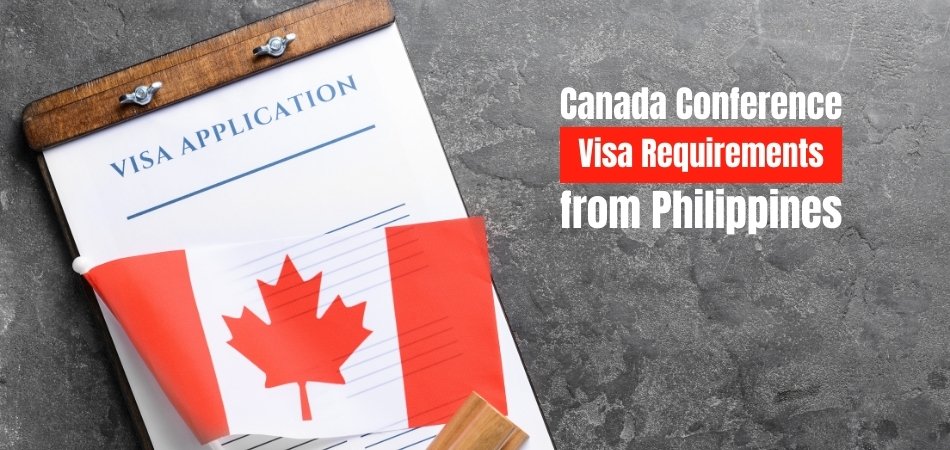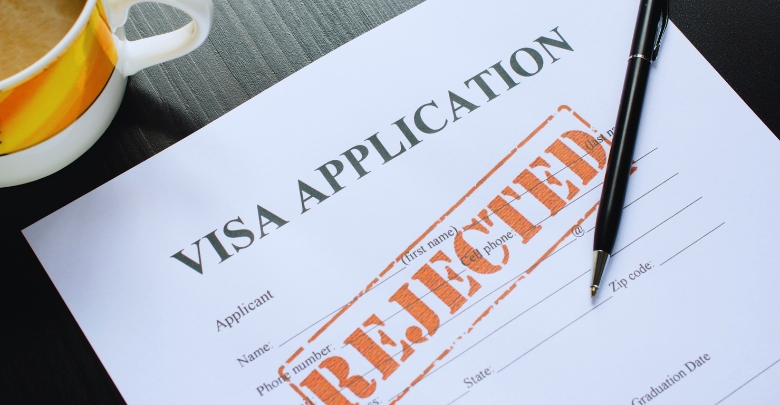Attending an international conference can be an enriching experience, especially in a vibrant country like Canada. However, before you can make this exciting journey, familiarizing yourself with the Canada conference visa requirements from Philippines is crucial for a hassle-free trip.
Filipino citizens need a Temporary Resident Visa (TRV) to enter Canada for conferences. This requires essential documents like a valid passport, an invitation letter from the Canadian organizer, proof of funds, and more. Meeting these requirements is necessary to secure the visa successfully.
Curious about the detailed process and documents involved? Read on to explore everything you need to know about the Canada conference visa and how to ensure a smooth application.
Who Needs a Canada Conference Visa from the Philippines?
If you’re planning to attend a conference in Canada from the Philippines, understanding the visa requirements is essential. A Canada Conference Visa ensures you have legal entry for professional events. Here’s who needs it and why:

Professionals Attending Business Conferences
If you’re a business professional attending a conference related to your industry, a Canada Conference Visa is necessary. This visa allows you to network, learn, and present your expertise to a global audience. It also ensures your stay in Canada complies with their immigration policies, making your trip seamless.
Students Participating in Academic Conferences
Students attending academic conferences or presenting research findings in Canada need this visa. The program exposes students to global academic standards and international forums. Furthermore, knowing about upcoming conferences in Canada can help students plan and prepare well in advance for their participation. You gain valuable experience with this visa, boosting your credentials.
Healthcare Practitioners for Medical Conferences
Healthcare professionals, including doctors, nurses, and specialists, require a Canada Conference Visa to attend medical conferences. This visa supports medical practitioners seeking to learn about the latest advancements and innovations. It’s vital for gaining insights, networking with global experts, and sharing knowledge that benefits healthcare in the Philippines.
Researchers and Scientists Presenting Papers
If you are a researcher or scientist from the Philippines aiming to present a paper in Canada, a conference visa is mandatory. This visa enables you to participate in scientific discussions, collaborate on research projects, and receive constructive feedback. It’s also a gateway to establishing international research ties and boosting your career.
Government Officials Engaged in Policy Discussions
Government officials representing the Philippines at international policy conferences in Canada need this visa. It allows them to discuss global policy matters, learn about governance strategies, and build diplomatic relations. This visa also ensures compliance with Canadian laws, securing their participation in international policy dialogues.
Applying for the right visa is crucial for a successful trip. Ensure you meet all requirements for a smooth conference experience in Canada.
What Are the Canada Conference Visa Requirements from Philippines?
For a successful application, you must be aware of Canada conference visa requirements from the Philippines. Whether you’re a business professional or a researcher aiming to attend an international event, being well-prepared can make a significant difference in securing your visa approval. Here’s a complete list of requirements you must fulfill.
Valid Passport
You need a valid passport to start your visa application. The passport should be valid for at least six months beyond your intended stay in Canada. Make sure that it has enough blank pages for the visa stamp and any entry or exit stamps during your travel.
Invitation Letter from the Conference Organizer
An invitation letter is a crucial document for your application. It should be provided by the conference organizer in Canada, detailing the event’s name, purpose, dates, and venue. This letter must be on official letterhead and include the organizer’s contact details, confirming your participation.
Proof of Funds
Demonstrating your financial capacity is required to ensure you can support yourself during your stay. Submit recent bank statements, salary slips, or any other financial documents proving that you can cover travel, accommodation, and other expenses. This helps the visa officer verify that you won’t face financial difficulties while attending the conference.
Completed Visa Application Form
Fill out the application form accurately with all required information. Any errors or omissions could lead to delays or rejection, so double-check the details. Include personal information, travel dates, and purpose of visit when completing the form.
Travel Itinerary
A clear travel itinerary should be part of your application. It should outline your planned activities, including flight bookings (not actual tickets), accommodation reservations, and a rough schedule of conference events. This helps to demonstrate your organized plans and the genuine purpose of the visit.
Cover Letter Explaining Purpose
Along with other documents, a cover letter explaining why you are attending the conference is important. In this letter, include details of the conference, how it aligns with your profession, and why you plan to return to the Philippines after the event. A well-written cover letter can support your visa application significantly.
Two Recent Passport-Size Photos
Your visa application must include two recent passport-size photos. These photos should meet Canadian photo specifications, including specific dimensions, neutral facial expressions, and a white background. Adhering to these specifications ensures your photos are accepted without issues.
Medical Examination Certificate (if required)
Depending on your medical history, a medical examination may be necessary. You should consult an authorized panel physician to get a valid medical certificate. This step ensures that you meet Canada’s health requirements for visitors.
No Criminal Record Certificate
Submit a clearance certificate from your local police department confirming your clean record. This certificate reassures Canadian authorities about your background. Therefore, when getting a Canadian conference visa from the Philippines, ensure that all these requirements are met thoroughly to avoid any application issues.
Meeting the Canada conference visa requirements from Philippines is key to ensuring a smooth application process. With accurate documents and complete information, you can increase your chances of visa approval and focus on your upcoming conference experience.
Canada Conference Visa Application Process for Philippines: Step-by-Step Guide
Applying for a Canada conference visa from the Philippines involves a systematic process. Each step plays a vital role in your application’s success, so follow the instructions carefully. Let’s walk through the process step-by-step to ensure you’re well-prepared.
Gather All Required Documents
Start by collecting the necessary documents, such as a valid passport, invitation letter, bank statements, and a completed visa form. Make sure each document meets the requirements, as missing information could delay your application. Organize everything in a folder for easy access during the process.
Fill Out the Visa Application Form
Visit the official Canadian visa website to access the Temporary Resident Visa (TRV) application form. Provide accurate information about your personal details, travel plans, and conference details. Double-check the form for any errors before submission, as even small mistakes could affect approval.
Pay the Visa Application Fee
Once the form is completed, proceed to pay the visa fee online or at an authorized payment center. Keep the payment receipt, as you’ll need it for your application. The fee covers the processing of your visa, and additional biometrics fees may apply.
Schedule and Attend the Biometrics Appointment
Book an appointment for biometrics submission, which includes your fingerprints and photograph. This is a mandatory step for most applicants from the Philippines. Arrive at the appointment center on time, bringing all required documents for verification.
Submit Your Application and Wait for Processing
Submit your application either online or at the designated visa application center. Once submitted, track your application status using the provided tracking number. Processing usually takes between 2 to 6 weeks, depending on the volume of applications.
Receive Your Visa and Prepare for Travel
If approved, collect your visa from the designated center or receive it by mail, depending on your chosen method. Verify all details on the visa, like validity and allowed duration of stay, before finalizing travel plans.
By following these steps, you can increase your chances of a successful application. Stay organized and proactive to ensure a smooth process from start to finish.
What Is the Processing Time for a Canada Conference Visa from Philippines?
The processing time can vary depending on factors such as application volume, time of the year, and individual circumstances. Generally, it takes about 2 to 6 weeks for the visa to be processed. Being aware of the expected timeline can help you plan better and reduce stress before your conference date.
Standard Processing Time
The typical processing time ranges from 2 to 6 weeks. This can vary depending on the volume of applications at the visa center. It’s best to apply at least two months before your intended travel date to account for any unexpected delays.
Peak Application Periods
Processing times tend to be longer during peak seasons, such as summer and holidays. During these periods, there is an increase in visa applications, which may extend the timeline to 8 weeks or more. It’s advisable to submit your application well in advance during these months.
Biometrics and Interview
If you’re required to provide biometrics or attend an interview, this may add 1-2 weeks to the processing time. You’ll receive instructions to schedule biometrics after submitting the online application. This step is part of the Canadian visa processing time for Filipino attendees, making early booking essential to avoid delays.
Incomplete or Incorrect Applications
If there are any errors in your application or missing documents, the visa office may ask for additional information. This can add up to several weeks of extra processing time. Carefully check your application before submission to avoid delays.
Visa Approval and Collection
Once your visa is approved, you’ll need to collect your passport from the visa application center, which can take a few days. Ensure you keep track of your visa status online to know when your passport is ready for collection.
By keeping these timelines in mind, you can plan your travel with greater confidence. Always prepare early to avoid any last-minute rush or stress.
What to Do if Your Canada Conference Visa Is Denied?
If your Canada conference visa application is denied, it can be disheartening. But don’t lose hope! There are ways to address the rejection, correct errors, and increase your chances of approval in the future. Here’s what to do next:
- Know the Reason for Denial: Carefully read the rejection letter to understand the exact reasons your application was denied. It will help you know what went wrong and how to fix it next time.
- Gather Additional Supporting Documents: If the denial was due to insufficient documentation, collect more evidence. This could include proof of ties to the Philippines, financial stability, or a more detailed invitation letter from the conference organizer.
- Review Your Application Thoroughly: Go through your previous application and identify any inaccuracies or missing information. A second look can reveal errors that may have affected the decision.
- Reapply After Addressing Issues: Once you’ve rectified the issues mentioned in the rejection, you can reapply. Make sure your application is complete, accurate, and backed with sufficient supporting documents.
- Consider Seeking Professional Help: If you’re uncertain about the reapplication process, consult an immigration consultant or legal expert. They can offer insights to strengthen your application and increase your chances of success.
- Write a Cover Letter for Reapplication: Attach a cover letter explaining how you have addressed the issues from the previous application. This shows your commitment to fulfilling the visa requirements and attending the conference.
- Prepare for an Interview: If an interview is part of the reapplication process, be ready to explain your intention clearly and confidently, emphasizing the importance of attending the conference.
Remember, a visa denial is not the end of your journey to attend the conference. By addressing the reasons for rejection and improving your application, you can pave the way for a successful reapplication.
Common Mistakes to Avoid During the Canada Conference Visa Application
Applying for a Canada conference visa from the Philippines can be daunting if you’re unfamiliar with the process. Mistakes are common, but they can delay your approval or even lead to rejection. Here are key errors to avoid for a smoother application experience:
Incomplete Forms
Ensure that every field in the application form is accurately filled out. Missing sections can cause delays or even denial, as incomplete information raises doubts about your eligibility. Double-check each page before submission to avoid this mistake.
Incorrect Information
Providing incorrect details like your name, passport number, or travel history can lead to application rejection. Even minor errors, such as misspellings, can cause issues. Verify all details thoroughly and seek help if you’re unsure about any section.
Missing Documents
Not attaching required documents like bank statements, invitation letters, or travel itineraries can disrupt your application process. A missing document can slow down the review process, making it critical to have a complete checklist before submission. Submit all documents in the specified format.
Applying Late
Delayed applications can create issues, especially if the conference date is near. Visa processing may take longer than expected, especially during peak seasons. Apply at least two months in advance to allow for processing time and unexpected delays.
Ignoring Financial Proof
Insufficient financial documentation can hurt your application, as Canadian authorities need to be sure you can cover your trip. Provide clear evidence of adequate funds, including bank statements and sponsorship letters if applicable.
Avoiding these common mistakes can significantly improve your chances of getting your Canada conference visa approved. Preparation and attention to detail are key to a successful application.
Frequently Asked Questions
Here are some frequently asked questions about Canada conference visa requirements from Philippines to help clarify additional concerns. Whether you’re planning your first business trip or seeking details on specific aspects, these questions cover vital information you may need.
Is Travel Insurance Mandatory for A Canada Conference Visa from The Philippines?
No, travel insurance is not mandatory, but it is highly recommended. It covers unexpected medical issues, trip cancellations, or emergencies, ensuring peace of mind during your conference visit to Canada.
Can I Work in Canada with A Conference Visa from The Philippines?
No, a conference visa does not allow you to work in Canada. It is strictly meant for attending the conference. You cannot take up employment or receive payment for services during your stay.
How Long Is a Canada Conference Visa Valid for Filipino Applicants?
The validity depends on the visa officer’s discretion. Generally, it allows you to stay for up to six months, based on your conference duration and travel plans as outlined in your visa application.
Can I Apply for A Canada Conference Visa from The Philippines Online?
Yes, you can apply online through the official Canadian immigration website. Ensure you have scanned copies of your documents ready and a valid payment method for the visa and biometrics fees.
Can a Minor Apply for A Canada Conference Visa from The Philippines?
Yes, but minors need to apply with the assistance of a parent or guardian. Additional documents, like parental consent letters, are required to demonstrate the purpose of the trip and ensure the minor’s safety.
Final Remarks
Securing a visa for a business event can open doors to new professional opportunities. By following the Canada conference visa requirements from Philippines, you’ll be better prepared for a smooth application process, minimizing potential delays or rejections.
Make sure to gather all essential documents, complete forms accurately, and submit your application well ahead of the conference date. This approach not only boosts your approval chances but also ensures peace of mind as you plan your trip.
Eager to grow your career through international networking? Use this guide to avoid common mistakes and successfully obtain your visa. With careful preparation, you’ll soon be exploring valuable connections and experiences at your upcoming conference in Canada.







